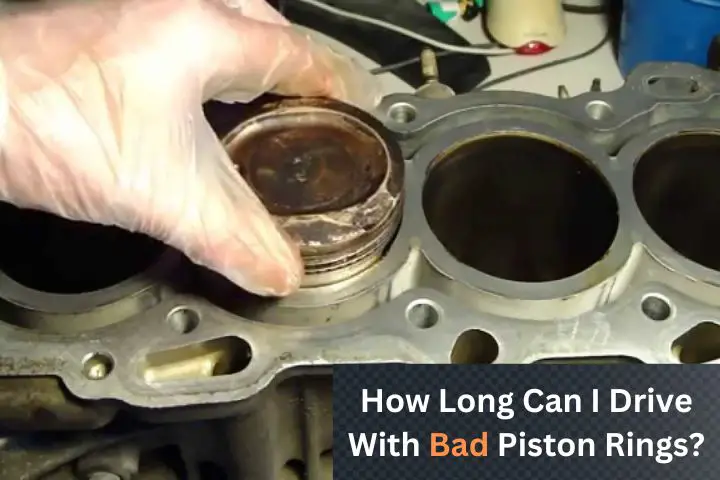Worried about how long you can drive with bad piston rings? Piston rings are small parts usually buried deep within the engine and attached to pistons to help pressurise the combustion chamber.
These rings are integral to the combustion process. Without a tight seal, the combustion chamber/cylinder cannot pressurize. As such, the engine will lose performance and effectiveness.
If you drive your car for hundreds or thousands of miles with bad piston rings, not only will you damage the piston rings excessively. But you may cause damage to the engine and the car.
Want to know how long you can drive with bad piston rings?
Keep reading!
How Long Can I Drive With Bad Piston Rings?
Some drivers have driven their vehicles with bad piston rings for hundreds or thousands of miles. However, this is not advisable as it can cause further damage to your engine. In addition, driving with bad piston rings increases the risk of an accident.
If you have been driving your vehicle for hundreds or thousands of miles with bad piston rings without replacing them, it’s advisable to stop your vehicle immediately. Then, drive to a local repair shop where a professional mechanic using special tools can inspect the piston rings.
The longer you keep driving your vehicle with bad piston rings, the worse it will become. If you want to know if you have bad piston rings, the first thing you should check is the engine oil level. If the level is low, it’s an indication the piston rings are allowing oil to escape the engine or pass into the combustion chamber.
So, when the mechanic is topping up your oil, he can inspect the piston rings for signs of excessive wear and tear or damage.
Can Bad Piston Rings Ruin Your Engine?
One of the symptoms of bad piston rings is declining engine performance. Poor engine performance is usually noticeable because the car will not function like it used to. The car may stall, shudder or even stutter.
If your engine is performing poorly, then it will be challenging for your car to haul large loads. Whether it’s on the farm or field, your car will strain when attempting to tow or haul large loads.
Besides difficulty towing or hauling loads, declining engine performance as a result of bad piston rings will make your car start to lose acceleration. It will begin to either stutter or shudder. The loss of acceleration will be noticeable as your car will have difficulty accelerating to higher speeds. This is true especially when driving uphill.
Lucky for you, bad piston rings cannot ruin your engine. Changing them immediately can restore your engine to normal functionality.
What Happens if You Don’t Fix Bad Piston Rings?
When you run a car with good piston rings, the engine will exhaust naturally, and it will be a thin white smoke. However, if you have bad piston rings, they will cause the color to change. With time, the color will start to turn into a thick, dark gray or bluish. In addition, you’ll smell burning oil.
How does this happen? When piston rings fail, the seal breaks where the combustion happens. This erodes the barrier between the oil and the fuel-air mixture. The intruding oil offsets the fuel-air mixture.
So, when the spark plug ignites the fuel-air mixture, the leaking oil also ignites. This causes a dirty burn thus the thick, dark gray or bluish smoke. Besides the intruding oil in the combustion chamber, you may find oil in the intake manifold.
When combustion happens around bad piston rings, the oil may be forced back into the intake manifold. Also called blow-by, you can identify this issue with an oily film or drops on the air filter or intake.
What you need to know is that oil does not belong in the intake manifold. This is because any static shock can ignite the oil. As a result, serious damage will occur to your engine. In addition, the incident may harm you.
Do You Need a New Engine if Your Piston Rings Are Bad?
Wear and tear are the most common cause of bad piston rings. When you start your engine, the piston rings rub against the cylinder walls. With time, the friction wears the piston rings down. This can happen all at once if the engine suffers a sudden mechanical failure or over time.
Besides friction, carbon deposits can build up on the rings. These deposits come from coolant leaks, fuel or oil. As these deposits build up, they cause the piston rings to stick to the cylinders. In the end, what your engine will experience is loss of power and compression.
So, do you need a new engine if your piston rings are bad? No, you don’t need a new engine. You can simply replace the bad piston rings before driving any further. This is a simple procedure that you can do at home with basic tools and parts. Alternatively, you can always take your car to a local repair shop where a professional mechanic can do this for you. Once replaced, you should see an immediate improvement in your car’s fuel economy and performance.
Final Thoughts
The engine is an integral part of every vehicle. Within it, there are small parts that ensure the engine runs smoothly. These parts – piston rings – are susceptible to wear and tear like other components in the engine.
Bad piston ring symptoms are straightforward for a professional mechanic who can spot them. If you check your oil levels and see they’re low or notice a decline in engine performance or your car starts losing acceleration, then the cause could be bad piston rings.
It’s advisable not to drive your car any further if you identify these symptoms. Instead, drive your car to the nearest repair shop where a professional mechanic can take a look. To prevent this issue, we recommend carrying out regular and periodic maintenance and replacing bad piston rings.

